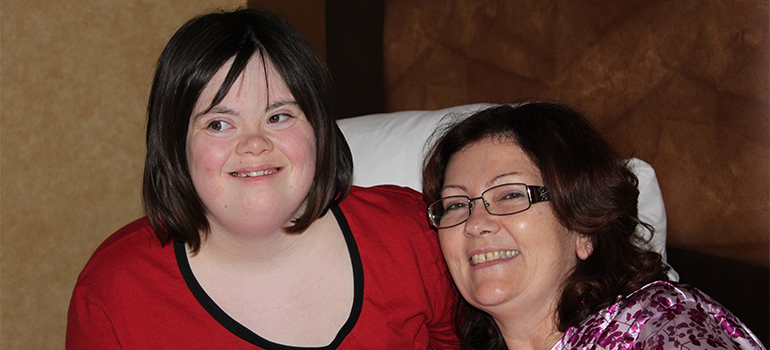By Brian Lin
Senior Communications Coordinator, UBC Public Affairs

Andrea Jeffrey (left) with her mother Edwina. Photo: Edwina Jeffrey.
UBC researchers find that many parents of children with Down syndrome have unique perspectives on the possibility of a remedy
Hours after Edwina Jeffrey gave birth to her second child in Etobicoke, Ontario, the doctor on duty gave her the news.
“Mrs. Jeffrey, are you awake? It looks like your daughter has Down syndrome,” he said. “I can see you’re a little upset, but I want to move her to Children’s Hospital in Toronto and have her heart checked out.”
Andrea, born New Year’s Day 1989, was promptly whisked away.
“It was pretty devastating at the time,” recalls Jeffrey. “I thought, this poor little baby, I wasn’t able to hold her, I didn’t know what her future was going to be.
Today, Andrea is a healthy, gregarious young woman with a penchant for glitter. She enjoys gymnastics and loves to dress up. “She goes to her day programs in one outfit and changes into another just in time for dinner,” says Jeffrey. “It just means more laundry for me.”
In addition to raising Andrea, Jeffrey has dedicated her time to ensuring parents like her receive the support they need. That’s why she participated in the first studies that asked parents of children with Down syndrome about how the medical profession should best discuss the condition with parents.
Researchers also asked parents like Jeffrey about the prenatal testing and the prospect of a cure for Down syndrome, and found that many would not necessarily welcome a remedy.
Video: Parents’ attitudes surveyed in new UBC studies.
No need for a cure?
UBC’s Catriona Hippman, Angela Inglis and Jehannine Austin have been gathering and analyzing insights into Down syndrome patients and their families for the past three years, and find that more research on the challenges they face is sorely needed.
“Advances in molecular genetics have raised the possibility that treatments or a cure for Down syndrome may be within reach,” says Inglis, a clinical assistant professor in the Department of Psychiatry. “Until now, there were no data on how parents of children with Down syndrome feel about the possibility of reversing intellectual disability or curing the condition entirely.”
“One of the reasons we haven’t done this sooner is because in medicine we tend to hold a medical view of disability, which assumes that [conditions like] Down syndrome must be associated with suffering – not just for the individuals with the condition, but also for their family members,” says Austin. “Research has shown that this is not necessarily the case at all, and our findings support that.”
The UBC studies found that while nearly two-thirds of the 101 participants acknowledged that a cure would increase their child’s independence, only 41 per cent said they would cure their child of Down syndrome if they could, and half questioned the motive for developing a cure at all.
“The implications of a cure on the child’s personality was a major theme,” says Hippman, a clinical assistant professor in the Department of Psychiatry. “If you reverse an individual’s intellectual disability, would her personality change as a result?”
Many parents from the study also felt it was more acceptable if a cure could be administered either prenatally or shortly after birth. “If you’re able to make the changes early on, then a child isn’t growing up with being treated differently,” Hippman adds.
Then there’s the issue of physical appearances. If an adult with Down syndrome is cured of the condition but still bears some of its telltale physical traits, would they still be stigmatized?
In addition to further exploring parents’ wishes, researchers would like to see further work to involve individuals with Down syndrome themselves to see how they feel about possible treatments.
Just the way you are
As for Jeffrey, she loves Andrea just the way she is.
“You and I are two different people, we have different thoughts, different ways of living our lives,” she says. “What’s wrong with someone with an extra chromosome who can also be part of our community? Why should we tinker with that?
“Andrea simplified our lives quite a bit. She gets happy over the simplest things, things we may take for granted. She brings a lot of joy into our life, and I wouldn’t change that.”